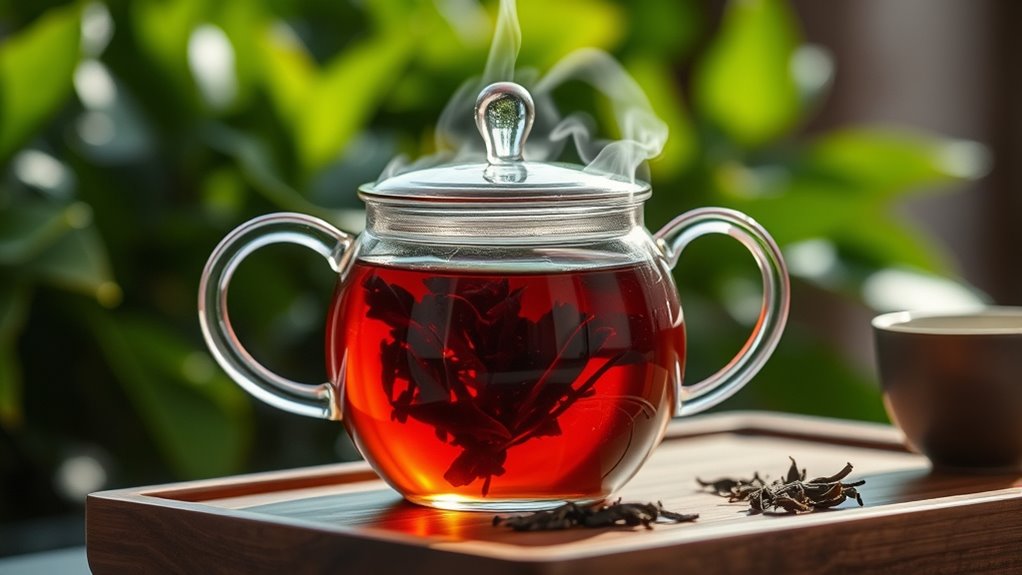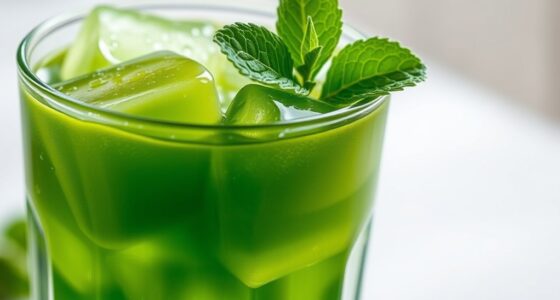Oolong tea can support your weight loss efforts by naturally boosting your metabolism and helping your body burn fat more efficiently when combined with a balanced diet and consistent exercise. While it’s not a miracle solution, replacing sugary drinks with oolong can curb cravings and increase calorie burn subtly throughout your day. Keep in mind, its benefits are most noticeable when paired with healthy habits—learn more about how it fits into your routine below.
Key Takeaways
- Oolong tea contains antioxidants and caffeine that may support increased metabolism and fat oxidation, aiding weight management.
- While promising, evidence for oolong’s weight loss benefits is suggestive, not conclusive.
- Replacing sugary drinks with oolong can reduce calorie intake and support healthy habits.
- Oolong works best as part of a balanced diet and exercise routine, not as a standalone solution.
- Its flavor and hydration benefits can help curb cravings and promote consistent healthy choices.

If you’re looking for a natural way to support your weight loss journey, oolong tea might be worth trying. Many people compare it to green tea because both are rich in antioxidants and have been linked to weight management. One of the key reasons oolong is gaining attention is its potential to give your metabolism a boost. While green tea is often praised for its fat-burning properties, oolong also contains compounds that can help increase your body’s energy expenditure. When you drink oolong, you might notice a slight uptick in how your body burns calories throughout the day, making it easier to stick to your weight loss goals.
Oolong tea may boost metabolism and support your weight loss efforts naturally.
The idea that oolong can help with weight loss is partly rooted in its ability to enhance thermogenesis, the process by which your body generates heat and burns calories. Some studies suggest that drinking oolong tea can accelerate fat oxidation, especially when combined with a healthy diet and regular exercise. This is similar to the effects seen with green tea, which is known for its catechins and caffeine content that promote a metabolic boost. Oolong, however, offers a slightly different profile of antioxidants and caffeine, which might provide a comparable or even synergistic effect when it comes to fat burning.
It’s important to understand that no single food or drink is a miracle cure for weight loss. Oolong tea alone won’t melt away pounds overnight, but it can be a helpful addition to your overall routine. When you incorporate it into your daily habits—replacing sugary beverages or high-calorie drinks—it can support your efforts by subtly increasing your calorie burn. Keep in mind that consistency matters. Drinking oolong regularly, along with maintaining a balanced diet and staying active, is what really makes a difference.
Many people find that replacing their usual drinks with oolong tea is an enjoyable way to stay hydrated while potentially aiding their weight loss. The subtle flavor and the warmth of the tea can also help curb cravings for less healthy snacks, keeping your appetite in check. While the evidence supporting oolong’s effects isn’t definitive, the potential metabolic boost it offers can be a motivating factor. Just remember, no matter how much oolong tea you drink, it’s most effective when combined with a healthy lifestyle. So, if you’re hoping to lose weight naturally, consider adding oolong to your routine, and enjoy the benefits of supporting your metabolism in a gentle, natural way. Additionally, selecting teas with proven metabolic benefits can enhance your efforts for sustainable weight management.
Frequently Asked Questions
Can Oolong Tea Replace Exercise for Weight Loss?
You can’t rely on tea consumption alone for weight management. While oolong tea may boost metabolism slightly, it doesn’t replace the benefits of regular exercise. Incorporating exercise into your routine is essential for effective weight loss. Oolong can support your efforts, but it shouldn’t be the sole strategy. Focus on a balanced diet, physical activity, and mindful tea consumption to achieve sustainable results.
How Much Oolong Tea Should I Drink Daily?
You might think you can drink endless amounts of oolong tea, but moderation is key. Typically, you should aim for 2-3 cups daily, which provides a healthy dose of caffeine and antioxidants. When tea brewing, keep in mind that the caffeine content varies, so avoid overdoing it to prevent side effects. Stick to this amount for best results and enjoy the benefits without going overboard.
Are There Any Side Effects of Drinking Oolong Tea?
You might wonder if drinking oolong tea has side effects. If you’re sensitive to caffeine, it could cause jitters, insomnia, or increased heart rate. Some people may experience allergic reactions like skin rashes or stomach upset. It’s important to monitor how your body responds and limit intake if needed. Always consult a healthcare professional if you notice adverse effects, especially if you have existing health issues or caffeine sensitivity.
Does Oolong Tea Affect Sleep Quality?
Did you know that oolong tea contains about 30-50 milligrams of caffeine per cup? This caffeine content can affect your sleep quality, especially if you drink it late in the day. Caffeine can cause sleep disruption by making it harder to fall asleep or reducing REM sleep. To avoid this, try drinking oolong earlier and cut back if you notice your sleep quality declining.
Can Oolong Tea Help With Fat Loss Around the Abdomen?
You might wonder if oolong tea helps reduce abdominal fat. While herbal benefits include antioxidants, it can also boost your metabolism, aiding fat loss. Drinking oolong regularly may support your efforts, but it’s not a magic solution. Combining it with a healthy diet and exercise is key. So, yes, oolong tea can be part of your weight management plan, thanks to its metabolism-boosting properties.
Conclusion
So, if you’re considering oolong tea for weight loss, remember that while some studies show it can boost metabolism by up to 10%, it’s not a magic fix. Combining it with a healthy diet and regular exercise is your best bet. Keep in mind, over 60% of adults worldwide struggle with weight management—so small changes like drinking oolong can make a difference. Stay consistent, and you might just see those extra pounds start to shift.










